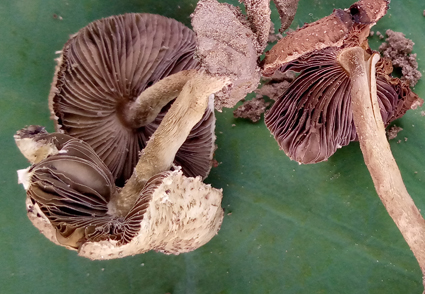Abstract
Many basidiomata collected during a fungal survey of the Indus Riverbed revealed two new taxa in the genus Xanthagaricus. Phylogenetic analyses of the Internal Transcribed Spacers (ITS) & ribosomal Large Subunit (28S) have confirmed that these new species (namely Xanthagaricus punjabensis & Xanthagaricus kotadduensis) form a separate clade with a strong bootstrap value from the closest species of Xanthagaricus. The closest taxon to Xanthagaricus punjabensis is X. Thailandensis, while Xanthagaricus kotadduensis is closely related to X. omanicus. Xanthagaricus punjabensis is unique due to its umbonate disc, dull orange to light yellow lamellae, gray rhizomorphic mycelial mat at the base of stipe, presence of annulus, globose to subglobose basidiospore, narrowly utriform to utriform cheilocystidia, and clavate to broadly clavate caulocystidia. Our second new taxon, X. Kotadduensis, can be characterized by the absence of annulus, utriform to knobbed cheilocystidia, and oblong caulocystidia. Our results strongly support the placement of the new taxa within the genus Xanthagaricus and provide a unique insight into the phylogenetic relationships within this genus. With this addition, the number of known species of Xanthagaricus from Pakistan becomes three.
References
<p>Bashir, H., Usman, M. & Khalid, A.N. (2020) <em>Lepiota cholistanensis</em> a new species of <em>Lepiota</em> (Agaricaceae: Basidiomycota) from Cholistan desert, Pakistan. <em>Phytotaxa</em> 455 (4): 267–276. https://doi.org/10.1007/BF02183055</p>
<p>Gardes, M. & Bruns, T.D. (1993) ITS primers with enhanced specificity for Basidiomycetes-Application to the identification of mycorrhizae and rusts. <em>Molecular Ecology</em> 2: 113–118. https://doi.org/10.1111/j.1365-294X.1993.tb00005.x</p>
<p>Ge, Z.W., Chen, C.M. & Yang, Z.L. (2008) A new species of the genus <em>Hymenagaricus</em> (Basidiomycota) from Taiwan and its phylogenetic position inferred from ITS and nLSU sequences. Cryptogamie, <em>Mycologia </em>29 (3): 259–265.</p>
<p>Ge, Z.W., Yang, Z.L. & Vellinga, E.C. (2010) The genus <em>Macrolepiota</em> (Agaricaceae, Basidiomycota) in China. <em>Fungal Diversity</em> 45 (1): 81–98. https://doi.org/10.1007/s13225-010-0062-0</p>
<p>Heinemann, P. & Flower, S.L. (1984) Hymenagaricus (Agaricaceae) de Kerala (Inde) et de Sri Lanka<em>. Bulletin du Jardin botanique national de Belgique/Bulletin van de Nationale Plantentuin van Belgie:</em> 151–182. https://doi.org/10.2307/3667871</p>
<p>Hosagoudar, V.B. & Abraham, T.K. (1997) <em>Xanthagaricus</em>, a new generic name in the family Agaricaceae. <em>New Botanist</em> 24: 93–100.</p>
<p>Hosen, M.I., Song, Z.P., Gates. G., Karunarathna, S.C., Chowdhury, M.S.M. & Li, T.H. (2017) Two new species of <em>Xanthagaricus</em> and some notes on <em>Heinemannomyces</em> from Asia. <em>MycoKeys</em> (28): 1. https://doi.org/10.3897/mycokeys.28.21029.</p>
<p>Hussain, S., Afshan, N.S., Ahmad, H., Sher, H. & Khalid, A.N. (2018) <em>Xanthagaricus pakistanicus</em> sp. nov. (Agaricaceae): first report of the genus from Pakistan. <em>Turkish Journal of Botany</em> 42 (1): 123–133. https://doi.org/10.3906/bot-1705-21</p>
<p>Ijaz, M., Ahmad, H.R., Bibi. S., Ayub, M.A. & Khalid, S. (2020) Soil salinity detection and monitoring using Landsat data: a case study from Kot Addu, Pakistan. <em>Arabian Journal of Geosciences</em> 13 (13): 1–9. https://doi.org/10.1007/s12517-020-05572-8</p>
<p>Khalid, A.N. (2022) A Checklist Of Macrofungi Of Pakistan Published From 1998–2020. <em>Pakistan Journal of Botany </em>54 (5): 1947–1962. https://doi.org/10.30848/PJB2022-5(23)</p>
<p>Kumla, J., Suwannarach, N., Sri–Ngernyuang, K. & Lumyong, S. (2018) <em>Xanthagaricus thailandensis</em> sp. nov. (Agaricales, Basidiomycota), from northern Thailand. <em>Phytotaxa </em>348 (2): 109–117. https://doi.org/10.11646/phytotaxa.348.2.5</p>
<p>Munsell, A. (1994) <em>Soil color charts, revised edition</em>. Macbeth Division of Kollmorgen Instruments Corporation, New York.</p>
<p>Rambaut, A. (2012) FigTree v1.4.2. [http://tree.bio.ed.ac.uk/software/figtree]</p>
<p>Reid, D.A. & Eicker A. (1998) South African Fungi 8. Three new species of <em>Hymenagaricus</em> from South Africa, with a revised key to South African taxa. <em>South African Journal of Botany</em> 64 (6): 356–360. https://doi.org/10.1016/S0254-6299(15)30924-8</p>
<p>Stewart, R.R. (1972) An annotated catalogue of the vascular plants of West Pakistan and Kashmir. <em>In</em>: Nasir, E. & Ali, S.I. (Eds.) <em>Flora of Pakistan</em>. Fakhri Printing Press, Karachi.</p>
<p>Sysouphanthong, P., Thongklang, N., Liu, J.K. & Vellinga, E.C. (2021) Description of <em>Lepiotaceous</em> Fungal Species of the Genera <em>Chlorophyllum</em>, <em>Clarkeinda</em>, <em>Macrolepiota</em>, <em>Pseudolepiota</em>, and <em>Xanthagaricus</em>, from Laos and Thailand. <em>Diversity</em> 13 (12): 666. https://doi.org/10.3390/d13120666</p>
<p>Usman, M. & Khalid, A.N. (2020) <em>Termitomyces acriumbonatus</em> sp. nov. (Lyophyllaceae, Agaricales) from Pakistan. <em>Phytotaxa</em> 477 (2): 217–228. https://doi.org/10.11646/phytotaxa.477.2.6</p>
<p>Vellinga, E.C. (2001) <em>Leucoagaricus</em>. <em>Flora Agaricina Neerlandica</em> 5: 85–108.</p>
<p>Wang, F., Qi, L.L., Zhou, X. & Li, Y. (2018) A new species and a new record of <em>Xanthagaricus</em> (Agaricaceae, Agaricales) from China. <em>Phytotaxa</em> 371 (4): 241–250. https://doi.org/10.11646/phytotaxa.371.4.1.</p>
<p>White, T.J., Bruns, T., Lee, S. & Taylor, J. (1990) <em>Amplification and direct sequencing of fungal ribosomal RNA genes for phylogenetics. In: PCR protocols: a guide to methods and applications</em>. Academic Press, San Diego, 482 pp. https://doi.org/10.1016/B978-0-12-372180-8.50042-1</p>


